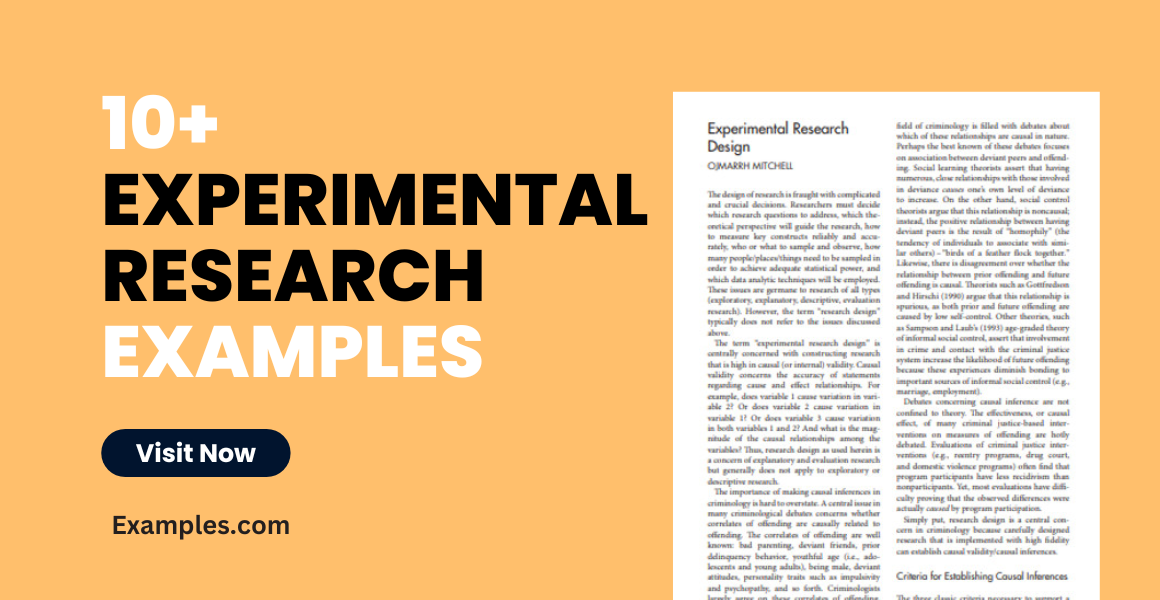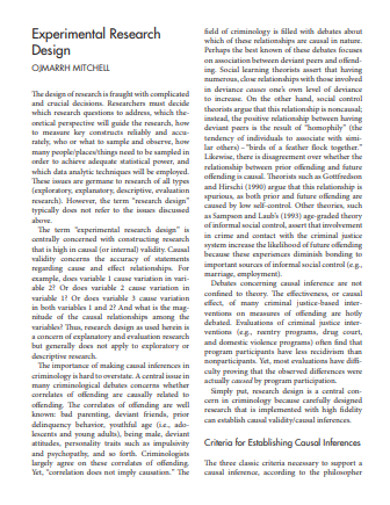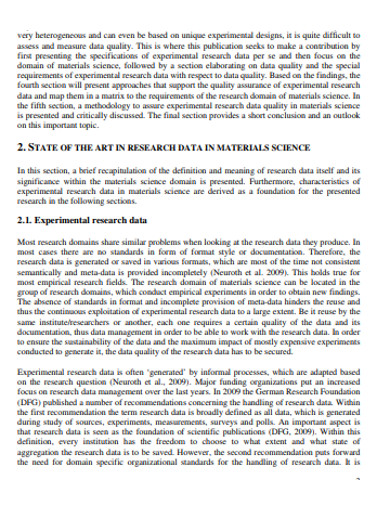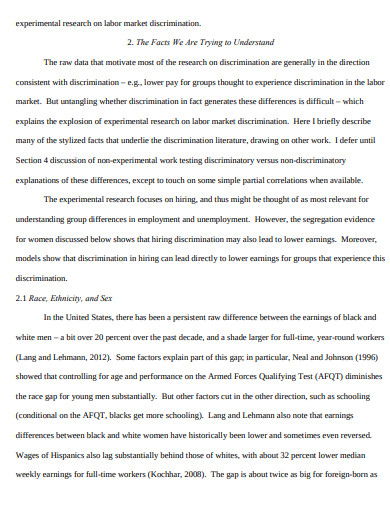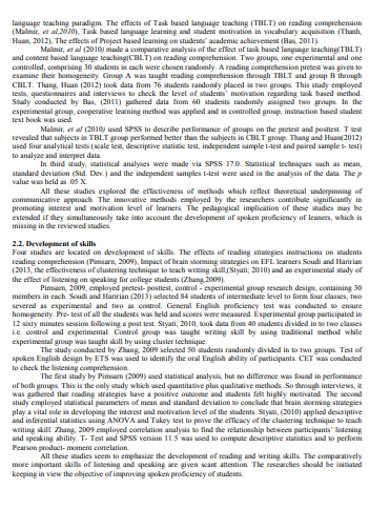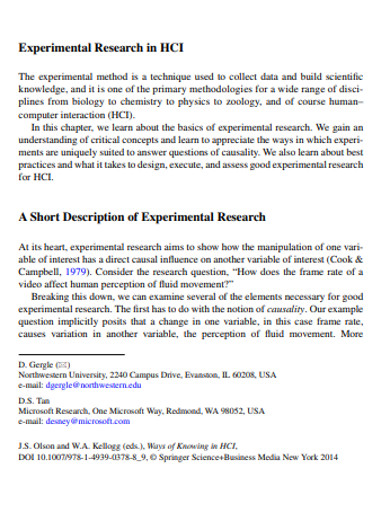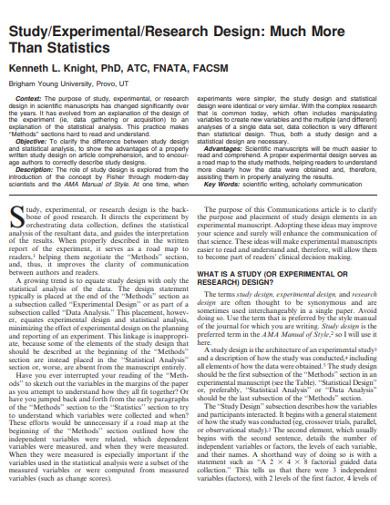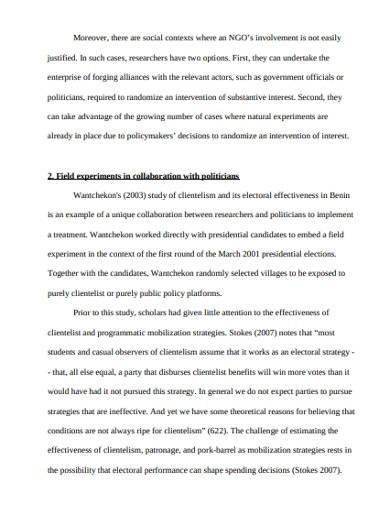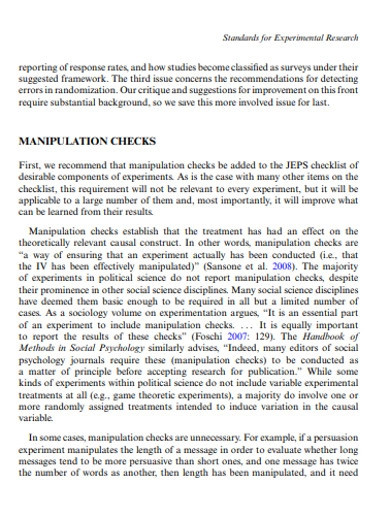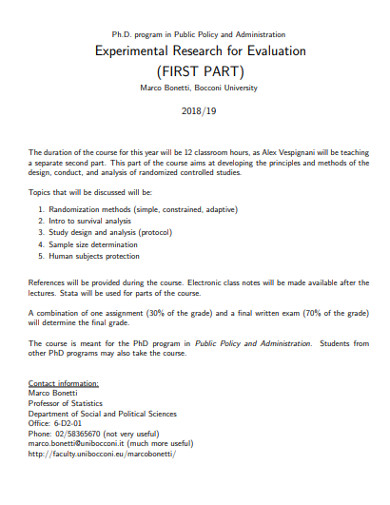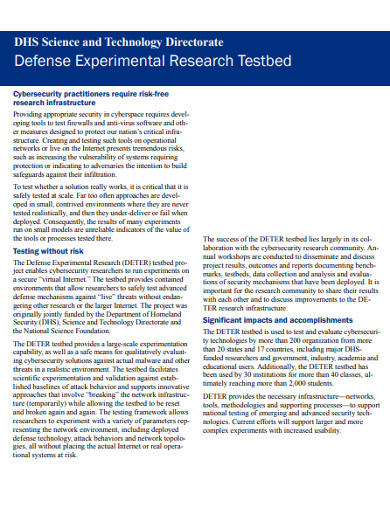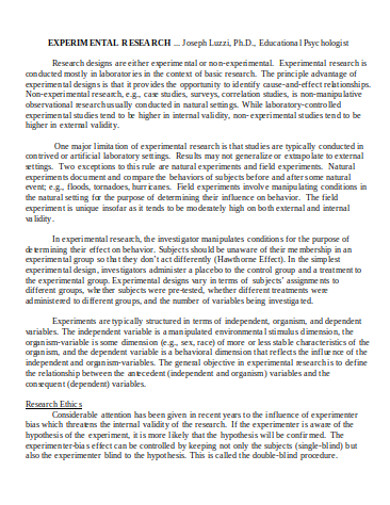10+ Experimental Research Examples to Download
Humans are born curious. As babies, we quench our questions by navigating our surroundings with our available senses. Our fascination with the unknown lingers to adulthood that some of us build a career out of trying to discover the mysteries of the universe. To learn about a point of interest, one of the things we do is isolate and replicate the phenomenon in laboratories and controlled environment. Experimental research is a causal investigation into the cause-effect relationships by manipulating all other factors. You may also see Student Research examples & samples
Experimental research is generally a quantitative research centered on validating or refuting certain claims on causative relationships of matter. We use this method in natural, applied, theoretical, and social sciences, to name a few. This research follows a scientific design that puts a weight on replicability. When the methodology and results are replicable, the study is verifiable by reviewers and critics.
Notable Experiments
We have been conducting experiments for the longest time. Experimental studies done some thousand of years ago prove that unrefined apparatus and limited knowledge, we were already trying to answer the questions of the universe. We had to start somewhere.
Anatomical Anomaly
Even before, societal beliefs have restricted scientific development. This is especially true for modern medicine. Back then, studying and opening cadavers is a punishable crime. Therefore, physicians based their knowledge on the human body on animal dissections. Because animals have a different body organization than humans, this limited what we knew about ourselves. It took actual studies and experiments on the human body to curtail the misinformation and improve medical knowledge.
Reviewing Resemblance
A garden of fuschia and peas helped change our understanding of heredity and inheritable traits. Mendel was curious about why the fuschia plants generate the colors of the flowers the way they do. He crossed varieties of the plant and obtained consistent results. He also tried to cross pea plants and came with repeatable results. The characteristics of the parent plants are passed down to their offsprings to a certain degree of similarity. He also figured out the predictability of certain traits to appear in the offspring. Mendelian genetics explain the laws of inheritance that are still relevant today.
Canine Conditioning
In the history of psychology research, one experiment will always ring a bell. Pavlov conditioned a dog to expect food when a bell was rung. After repetitions of this approach, the dog started to salivate at the sound of the bell, even when Pavlov didn’t introduce the food. His work on training the reflexes and the mind is in line with the plasticity of the brain to learn and unlearn relationships based on stimuli.
Correlation Vs. Causation
We can opt for an experimental approach to research when we want to determine if the hypothesized cause follows the expected effect. We do this by following a scientific research method and design that emphasizes the replicability of results to limit and reduce biases. By isolating the variables and manipulating treatments, we can establish causation. This is important if we are to find out the relationship between A and B.
In our experiments, we will encounter two or more phenomena, and we might mislabel their connection. There are instances where that relationship is both correlative and causative. What we need to remember is that correlation is not causation. We can say that A causes B when event B is an explicit product of and entirely dependent on event A. Events A and B are correlated when they appear together, but after experimentation, A doesn’t necessarily result in B.
However, it is not enough to say A caused B. Our results are still subject to statistical treatment to determine the validity of the findings and the degree of causation. We still have to ask how much A influences B. Only then can we accept or reject our hypothesis.
Experimental Research Value
Experimental research is a trial-and-error with an educated basis. It lets us determine what works and what doesn’t, and the underlying relationship. In our daily life, we are engaging in pseudo experiments. While cooking, for instance, you taste the dish before you decide to pour additional seasoning. You test first if the food is fine without additives.
In some fields of science, the results of an experiment can be used to generalized a relationship as true for similar, if not all, cases. Experimental research papers make way for the formation of theories. When those theories become unrefuted for a long time, they can become laws that explain universal phenomena.
10+ Experimental Research Examples
Go over the following examples of experimental research papers. They may be able to help you gain a head start in your study or uproot you from where you’re stuck in your experiment.
1. Experimental Research Design Example
2. Experimental Data Quality Research Example
3. Experimental Research on Labor Market Discrimination
4. Experimental Studies Research Example
5. Short Description of Experimental Research Example
6. Sample Experimental Design Research Example
7. Experimental Research on Democracy Example
8. Standards for Experimental Research Example
9. Experimental Research for Evaluation Example
10. Defense Experimental Research Example
11. Formal Experoimental Research in DOC
How To Start Your Experiment
The best scientists and researchers started with the basics, too. Here are reminders on how you could improve your research writing skills. Who knows, one day, you will join the ranks of world changers with your experimental research report
1. Identify the Problem
To solve a problem, you need to define what it is first. You can begin with identifying the field of research you wish to investigate, then find gaps in knowledge from the related literature. An original work on a timely and relevant issue will help with the approval of your research proposal. After you have read scholarly articles about the topic, you can start narrowing the focus of your research into a specific topic.
2. Design the Experiment
Create a research plan for your intended research with the following notes. The experimental research design ideally employs a probabilistic sampling method to avoid biases from influencing the validity of your work. However, certain experiments call for non-probabilistic sampling techniques. Your experiment should have a control group with ambient conditions or blank treatments. This set up helps you objectively quantify the relationship between A and B.
3. Test the Hypothesis
In performing your experiment, you should have a variable that you would manipulate. The effect of the manipulation will be reflected in the dependent variable. By manipulating the factors that would cause event B, you can determine if A does, in fact, cause B. You can input the raw data into statistical analysis software and tools to see if you can derive a valid conclusion on the relationship between A and B. Correlation or causation and their degree can also be determined by different statistical tests.
4. Publish the Findings
After you have gone through all the efforts in conducting your research, the next step is communicating the findings to the academic community and the public, especially if public and government entities funded the study. You do this by submitting your paper to journals and academic conferences. For what use is the new knowledge you have worked for if you keep the results to yourself?
Experimental research separates science from fiction. Despite criticisms that this method exists in an ideal world, removed from reality, we cannot downsize its merits in the search for knowledge. Because the results are observable, replicable, and appreciable in a real-world sense, this research type will always have room in the development of scientific knowledge and the improvement of man. For as long as man is curious, science will keep growing.


